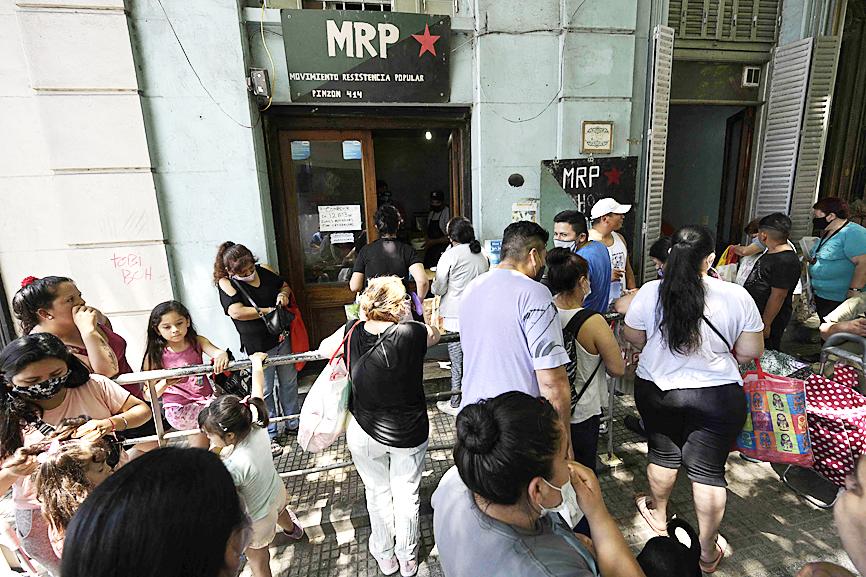Fatima Gomez, Stefani Chinguely and Carlos Alberto Alvareza head every day to a soup kitchen in their working class Buenos Aires neighborhood.
When the government shut down much of the economy to stop the spread of COVID-19, they had to give up work and now find themselves impotent in the face of rampant inflation that devours their meager savings.
“I’ve been coming to the soup kitchen for around five months. I always had work and earned good money,” Chinguel, 23, said. “But not anymore. Every day I send out my CV, but no one calls me.”

Photo: AFP
She leaves with two meals in a box: one for her and one for her partner who works in a shop, but whose salary is not enough to support them.
“Sometimes they increase my boyfriend’s salary, but 1,000 pesos [US$9] is not enough to match rising prices,” Chinguel said.
Inflation this year is 41.8 percent, one of the highest in the world — a key factor at play in Argentina’s parliamentary elections today.
Since turning 18, Chinguel has worked as a carer for the elderly and as a car saleswoman, among other jobs.
She heads to the soup kitchen in La Boca also in the hope of finding work.
Those working in the kitchen are given a state subsidy worth half the minimum monthly wage of 32,000 pesos.
“Many people want to work here, but there are no vacancies,” said Edith Cusipaucar, 40, a mother of six.
She also receives 15,400 pesos a month in family allowance for her three youngest children.
However, she still has to head out every evening to sell food on the street.
“Do you think you can feed a family with 15,400 pesos a month?” she said.
Soup kitchens run by social action groups with state funds have sprung up on practically every street corner in poor neighborhoods like La Boca.
Gomez works for a cleaning company and while she never lost her job during the COVID-19 pandemic lockdown, her employers simply do not have any offices to clean.
Her salary was practically reduced by half, and for the first time in her life she needed a soup kitchen to feed her three children and granddaughter.
“I work to survive. If I don’t take away food, we can’t manage at the end of the month. It’s not enough. Maybe we eat lunch, but not dinner,” said Gomez, who has lived in a boarding house for 20 years.
Alvarez, a 61-year-old peddler, says he cannot sell his wares anymore.
“In the street the police chase us. They don’t let us work,” he said. “I come here out of necessity, out of hunger. There’s no work, that’s why we come looking for work.”
Unemployment in Argentina was 9.6 percent in the second quarter of this year, with underemployment reaching 12.4 percent and poverty 40.6 percent.
“The pandemic accelerated processes that were already happening in the world where there is ever more informal or unrecognized work,” said Ezequiel Barbenza, a professor at Salvador University. “When, from one day to the next, they slow down the circulation of people and, as a consequence the economy, a system that was prepared to include all people is left exposed.”
During last year’s lockdown, the state offered assistance to informal workers.
“It was designed for 3 million people, 12 million applied and 9 million were accepted. It showed a huge universe,” Barbenza said.
The lack of work, alongside inflation and personal security, are the issues that most worry Argentines, political scientist Diego Reynoso said.
“It creates a lot of uncertainty for people and great discomfort. There is a society that is very worried, annoyed, unhappy, with fatal humor, which they aim at the government,” he said.
Just how much they blame the government would be apparent in today’s parliamentary elections.

Taiwan’s rapidly aging population is fueling a sharp increase in homes occupied solely by elderly people, a trend that is reshaping the nation’s housing market and social fabric, real-estate brokers said yesterday. About 850,000 residences were occupied by elderly people in the first quarter, including 655,000 that housed only one resident, the Ministry of the Interior said. The figures have nearly doubled from a decade earlier, Great Home Realty Co (大家房屋) said, as people aged 65 and older now make up 20.8 percent of the population. “The so-called silver tsunami represents more than just a demographic shift — it could fundamentally redefine the

Businesses across the global semiconductor supply chain are bracing themselves for disruptions from an escalating trade war, after China imposed curbs on rare earth mineral exports and the US responded with additional tariffs and restrictions on software sales to the Asian nation. China’s restrictions, the most targeted move yet to limit supplies of rare earth materials, represent the first major attempt by Beijing to exercise long-arm jurisdiction over foreign companies to target the semiconductor industry, threatening to stall the chips powering the artificial intelligence (AI) boom. They prompted US President Donald Trump on Friday to announce that he would impose an additional

China Airlines Ltd (CAL, 中華航空) said it expects peak season effects in the fourth quarter to continue to boost demand for passenger flights and cargo services, after reporting its second-highest-ever September sales on Monday. The carrier said it posted NT$15.88 billion (US$517 million) in consolidated sales last month, trailing only September last year’s NT$16.01 billion. Last month, CAL generated NT$8.77 billion from its passenger flights and NT$5.37 billion from cargo services, it said. In the first nine months of this year, the carrier posted NT$154.93 billion in cumulative sales, up 2.62 percent from a year earlier, marking the second-highest level for the January-September

Asian e-commerce giant Shein’s (希音) decision to set up shop in a historic Parisian department store has ruffled feathers in the fashion capital. Anger has been boiling since Shein announced last week that it would open its first permanent physical store next month at BHV Marais, an iconic building that has stood across from Paris City Hall since 1856. The move prompted some French brands to announce they would leave BHV Marais, but the department store had already been losing tenants over late payments. Aime cosmetics line cofounder Mathilde Lacombe, whose brand was among those that decided to leave following